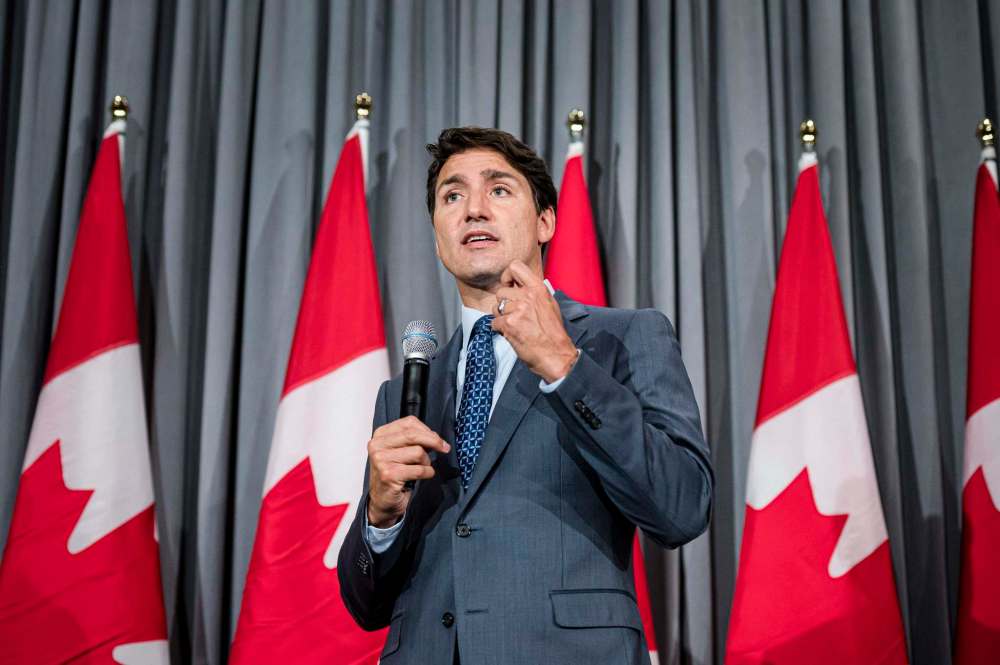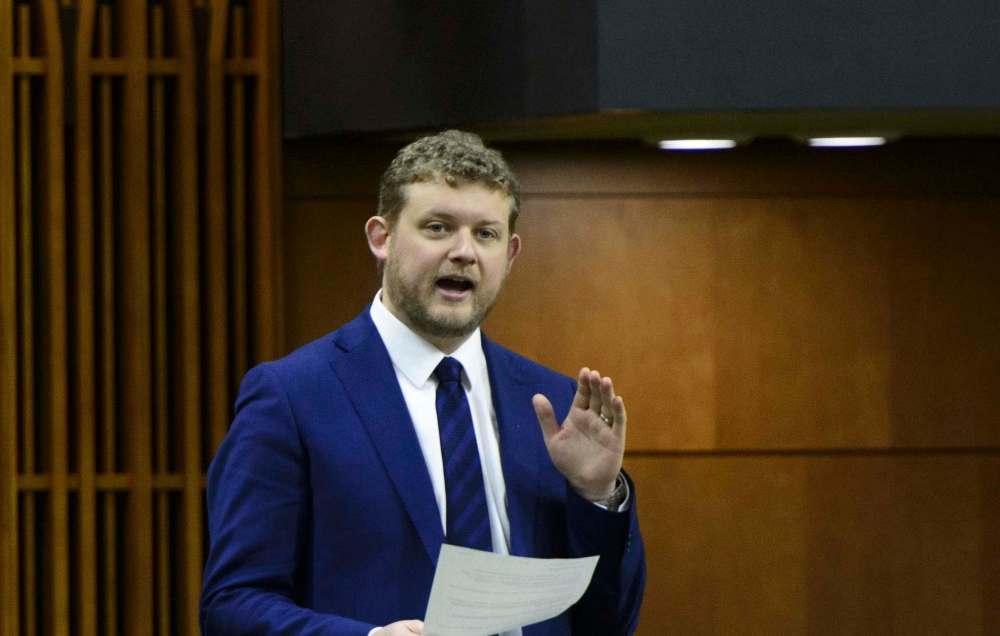Federal election call puts Winnipeg in spotlight
Advertisement
Read this article for free:
or
Already have an account? Log in here »
To continue reading, please subscribe:
Monthly Digital Subscription
$0 for the first 4 weeks*
- Enjoy unlimited reading on winnipegfreepress.com
- Read the E-Edition, our digital replica newspaper
- Access News Break, our award-winning app
- Play interactive puzzles
*No charge for 4 weeks then price increases to the regular rate of $19.00 plus GST every four weeks. Offer available to new and qualified returning subscribers only. Cancel any time.
Monthly Digital Subscription
$4.75/week*
- Enjoy unlimited reading on winnipegfreepress.com
- Read the E-Edition, our digital replica newspaper
- Access News Break, our award-winning app
- Play interactive puzzles
*Billed as $19 plus GST every four weeks. Cancel any time.
To continue reading, please subscribe:
Add Free Press access to your Brandon Sun subscription for only an additional
$1 for the first 4 weeks*
*Your next subscription payment will increase by $1.00 and you will be charged $16.99 plus GST for four weeks. After four weeks, your payment will increase to $23.99 plus GST every four weeks.
Read unlimited articles for free today:
or
Already have an account? Log in here »
Hey there, time traveller!
This article was published 10/09/2019 (2287 days ago), so information in it may no longer be current.
OTTAWA — Just 13 hours after polls close in Winnipeg, Manitobans will head into a federal campaign that could dramatically reshape the city’s ridings.
“Manitoba, federally, is going to be very competitive,” said Allan Tupper, a University of British Columbia politics professor. “It’s going to be a tight election.”
On Wednesday, at 9 a.m. (CDT), Prime Minister Justin Trudeau will arrive at Rideau Hall in Ottawa, and ask Gov. Gen. Julie Payette to call an election for Oct. 21.
The Liberals and Tories have been neck-and-neck in recent federal polls, which are leaning towards a minority government. That could mean a third party (NDP, Bloc Québécois or Greens) having a major say in policy.
The parties have been in unofficial campaign mode for weeks, digging up unflattering comments from years gone by to spar over issues such as gay marriage and abortion. The Liberals made an unprecedented amount of funding announcements over the summer, including in Winnipeg.
Trudeau took office in 2015, promising “real change,” and had an extended honeymoon to tackle poverty, gender equity and reconciliation.
The Liberals gradually lost their provincial allies, while the U.S. President Donald Trump-led administration’s threats to end the North American Free Trade Agreement took up months of attention. Spats with China and Saudi Arabia have threatened Canadian jobs, while Trudeau has yet to please either environmentalists or oil/gas pipeline proponents.
“Things toughened up and the world started to change, in some serious ways — some in his control, some not,” Tupper said.

!function(e,t,s,i){var n=”InfogramEmbeds”,o=e.getElementsByTagName(“script”)[0],d=/^http:/.test(e.location)?”http:”:”https:”;if(/^/{2}/.test(i)&&(i=d+i),window[n]&&window[n].initialized)window[n].process&&window[n].process();else if(!e.getElementById(s)){var r=e.createElement(“script”);r.async=1,r.id=s,r.src=i,o.parentNode.insertBefore(r,o)}}(document,0,”infogram-async”,”https://e.infogram.com/js/dist/embed-loader-min.js”);
The past six months have put the Liberals on defence, with a federal commissioner ruling Trudeau broke ethics laws in the SNC-Lavalin affair, and two of his signature, female cabinet ministers now running against his party.
Trudeau’s decision to eschew some of the leaders debates has Conservative Leader Andrew Scheer accusing him of cowardice.
The 41-day campaign will also test Canada’s resilience to foreign interference, with a non-partisan cadre of senior security officials who have vowed to go public if they feel a riding could be unfairly influenced. Meanwhile, third-party groups are already putting up billboards around the Manitoba capital.
The Liberals are trying to hold onto their seven Winnipeg seats, after sweeping the city in the 2015 election, which lasted a record 11 weeks.
This autumn’s six-week campaign will likely focus heavily on the economy.
Trudeau’s team is buoyed by strong job numbers and a drop in child poverty. Yet economists have raised concerns about wage growth, the cost of living, and how well the national economy could withstand the next downturn.
The Tories have seized on those concerns, painting Trudeau as an elitist who is out of touch with the average voter.
“They don’t see any benefit of these middle-class tax cuts,” said Conservative MP James Bezan.
The Selkirk-area MP said he’d rather be talking about the carbon tax, or fixing pensions and employment insurance, instead of social issues.
“They will try to invent any story that could sway voters. But I don’t think Canadians are buying it,” Bezan said, noting his party’s flattering fundraising results.
The NDP want to implement pharmacare and accelerate the Liberals’ pledges on poverty issues, while the Greens are asking for a restructuring of the economy to reach Canada’s climate targets.
Christopher Adams, a University of Manitoba political scientist, said this election will largely play out in Winnipeg suburbs, where most voters will face a choice between the Liberals and Conservatives.
Liberal MP Doug Eyolfson is “seriously in trouble,” Adams said, with a Charleswood-area riding that historically votes for the Tories, who are running former city councillor Marty Morantz.
Former Tory MLA Steven Fletcher, who held the federal riding through four elections, could make a dent with votes for the right-wing People’s Party of Canada, though polls don’t indicate a groundswell of support.
Adams said MaryAnn Mihychuk’s Kildonan—St. Paul seat is also vulnerable, with suburban neighbourhoods that lean Conservative, and the lack of a 2015-style Liberal wave.
Less hotly contested is Winnipeg Centre, where MP Robert-Falcon Ouellette is facing off against an NDP candidate who managed to take the party nomination over former provincial minister Andrew Swan.
“Leah Gazan was like the giant slayer, winning the nomination,” Adams said.
He’s also watching the ridings of Liberal MPs Terry Duguid (Winnipeg South) and Dan Vandal (St. Boniface—St. Vital). While both have name recognition from their terms as city councillors, their ridings dip heavily into the swing suburbs. Duguid’s southern riding in particular tends to be a bellwether for national results, meaning he’s “in for a dog fight.”

In Elmwood-Transcona, MP Daniel Blaikie holds the lone NDP seat in the city, which he won by just 61 votes four years ago. He’s up against Tory candidate Lawrence Toet, who won the riding in 2011.
Adams said he expects MPs Jim Carr (Winnipeg South Centre) and Kevin Lamoureux (Winnipeg North) to hold their ridings. Provincial Green Leader James Beddome is expected to run federally in Carr’s riding.
The hardest riding to track is Manitoba’s north. Niki Ashton has held Churchill—Keewatinook Aski since 2008. Her Liberal opponent, former MLA Judy Klassen, won her provincial seat in the area in a 2016 upset, despite a smaller campaign budget.
Adams believes the Liberals’ treatment of Jody Wilson-Raybould in the SNC-Lavalin affair may have turned off Indigenous voters from the party. Ashton has name recognition, including from her father, Steve, and the NDP tends to do well in mining towns, though the Tories could take support from either candidate.
Otherwise, the Tories are widely expected to hold their five rural seats in the province, despite pockets of support for the other parties in parts of Brandon.
dylan.robertson@freepress.mb.ca



